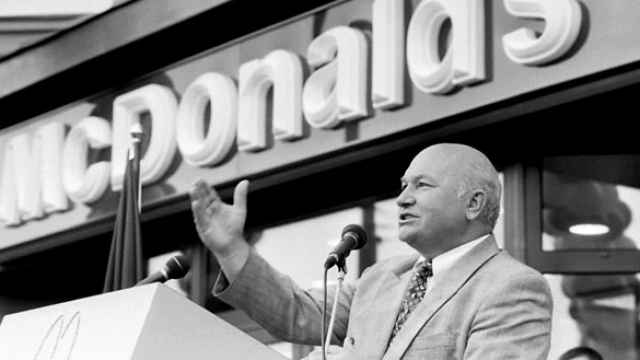Although Yury Luzhkov made a fair share of enemies during his 18 years as mayor, he also won respect from thousands of public sector workers and pensioners by using municipal funds to boost their income.
With Luzhkov's ouster, teachers, police officers and pensioners voiced worry Tuesday about cuts to their incomes — cuts that some said they had already heard were in the pipeline.
Moscow City Duma Speaker Vladimir Platonov offered assurances Tuesday that social benefits would remain the same.
"All the social benefits that have pleased Moscow citizens will stay," he said on Channel One television.
Any shakeup in social benefits could trigger unrest in the capital, something that the Kremlin certainly wants to avoid.
“He has done a lot for teachers, and the reason that we have free breakfasts for elementary schoolchildren is his merit," Lyudmila Krukova, principal of one of Moscow's public schools, said in an interview, adding that she learned about Luzhkov's dismissal from her students.
Like many teachers, Krukova is afraid that school employees will be stripped of so-called “Luzhkov bonuses,” the extra income paid by City Hall to supplement their federally mandated salaries.
Moscow teachers earn more than $1,000 a month, three times more than their counterparts in the regions.
On the Moscow police force, officers receive half their salaries from City Hall, said Mikhail Pashkin, head of an independent police trade union. He said by telephone that he has already received calls from police officers who were told by their superiors that City Hall would cut off the extra funds in October.
A master of populist politics, Luzhkov also paid benefits to pensioners, who constituted the core of United Russia party supporters in the capital. Luzhkov was a senior United Russia official before he quit the party Tuesday.
According to City Hall's estimates, about $2.5 billion was spent to support about 3 million pensioners in 2009, or nearly 8 percent of the city's 1 trillion ruble budget ($33 billion). The city's average monthly payment to a pensioner amounted to $100.
“Luzhkov has invested a huge amount of money into the social sphere. The people who will come after him will face a difficult task continuing in this path,” said Yevgeny Gontmakher, deputy head of the Institute of Modern Development.
Gontmakher said the next mayor will face a public backlash if he cuts the Luzhkov bonuses.
Yelena Lukyanova, a lawyer and member of the Public Chamber, said the next mayor would probably keep the city's social safety net in place to prevent unrest. “If the welfare system collapses, Moscow will blow up immediately,” she said.
She noted that while many teachers and doctors have voted for United Russia in Moscow, their colleagues across the country often prefer the Communist Party.
Just several days before Luzhkov's ouster, several prominent culture figures including actors Alexander Kalyagin and Armen Dzhigarkhanyan wrote a letter to President Dmitry Medvedev to support Luzhkov and criticized anti-Luzhkov broadcasts on state-controlled television.
“I don't like these kinds of campaigns, not because there were no problems, which are natural for such a big city, but because I know how much the mayor has done for culture and theaters — and my theater in particular,” Vladimir Urin, director of the Stanislavsky and Nemirovich-Danchenko musical theater, said Monday, RIA-Novosti reported.
But Alexander Gelman, a respected figure in the art world, said Luzhkov only helped some theaters financially, “according to his personal taste.”
“He acted like some noblemen during the Middle Ages who presented gifts to peasants and received gratitude from them," he told The Moscow Times. "But Moscow's overall culture has not been developed."
Editor’s note: This article has been corrected to say Moscow City Hall's 2009 budget amounted to 1 trillion rubles, not $1 trillion.
A Message from The Moscow Times:
Dear readers,
We are facing unprecedented challenges. Russia's Prosecutor General's Office has designated The Moscow Times as an "undesirable" organization, criminalizing our work and putting our staff at risk of prosecution. This follows our earlier unjust labeling as a "foreign agent."
These actions are direct attempts to silence independent journalism in Russia. The authorities claim our work "discredits the decisions of the Russian leadership." We see things differently: we strive to provide accurate, unbiased reporting on Russia.
We, the journalists of The Moscow Times, refuse to be silenced. But to continue our work, we need your help.
Your support, no matter how small, makes a world of difference. If you can, please support us monthly starting from just $2. It's quick to set up, and every contribution makes a significant impact.
By supporting The Moscow Times, you're defending open, independent journalism in the face of repression. Thank you for standing with us.
Remind me later.






